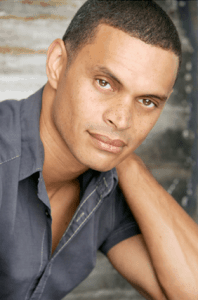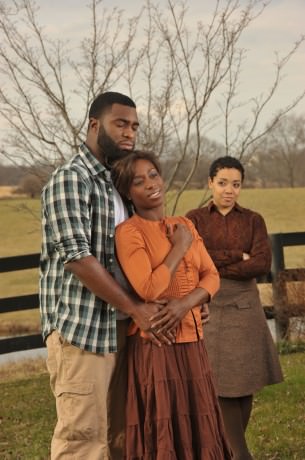
Shandon Youngclaus.
Rep Stage celebrates Black History Month and their 20th season with the 1980 Tony Award-nominated production of Home, written by Samm-Art Williams, in a limited run from February 27- March 17, 2013. The second part of my interview continues with Duane Boutté making his spirited directorial Rep Stage debut (He performed there in 2009-2010 as an actor in On the Verge), and it is week two of rehearsals. Perhaps best known for his acting roles in the films Stonewall and Brother to Brother, we learn that this production of Home will be performed in the round and will include original music composition by this versatile actor, director, and composer.
In Part II Boutté discusses the audition process and casting the talented actors who portray the multiple characters in the production, and he shares his early acting beginnings with Rep Stage’s Michael Stebbins. Welcoming the opportunity to present a timeless, coming of age play from the heart, personal insights on the themes of Home and the crossroads of Boutté’s own artistic career are revealed.
Sydney-Chanele: I’m interested in your audition process for Home and the selection of your cast. How did you decide on casting, and what did you look for in the actors who will be playing characters that have multiple roles?
Duane: Let’s start with Cephas Miles (the lead character). The most important thing is that he is someone that you care about. When we found Robert Lee Hardy, he is one of those people that if you spend a minute and half watching him on stage. I don’t know what it is about him but you immediately care. We liked him almost instantly for the role.
For the casting these were all appointment auditions and the Rep Stage staff basically helped us find these people. Yvonne Erickson does a lot of outreach to agents in the DC area to theater companies for suggestions, and then of course the Rep keeps good records for actors they’ve had over the years. Robert Lee Hardy is someone from Baltimore that we found and invited to read for us. He’s a Baltimore native, and we are proud to have him in the lead role for that reason. He is thrilled for the opportunity and we are thrilled to have him.
For the ladies, I had to select them really based on the most signature characters for their tracks, because they both play multiple roles. I’d say each woman play upward of twelve characters – that’s an estimate/ ballpark number at this point. With that in mind each one of them has a most memorable character as written. So I had to make sure that their essence fit that most memorable character, and also cast their versatility. Because this show has so much lyricism and poetry involved – and the playwright has invited singing – we also had to see how capable they were as singers. I’m a composer and we have a sound designer (Neil McFadden) who’s creating some music cues for transitions.
A composer too! Is this another way of bringing your personal touch to this production of Home? Will you use any of your original music in the play?
Yes, (original music will be used) in terms of any text that is sung. If it’s not a traditional song – there are a couple of church hymns that are briefly used – but anything else that comes from the text but invites song, are things that I’m composing. So in the audition process we took one of those just as a possibility of something we might do, and I composed a little something for them at the piano to kind of sight read, but also taught the song and then played the harmony. We found two amazingly talented women from the Washington, D.C. area Fatima Quander and Felicia Curry.

How did you discover Fatima Quander and Felicia Curry? What made them special in the audition?
Well I made three trips for the casting. Initially I wanted use actors in the 40-45 year age ranges for the roles and then have them look back, but then I discovered during the audition process that a slightly younger fit the role was more appropriate because of all of things we travel through and the ending. Also, the ending age for these characters really should be not quite 40, or 40 at the oldest. Ahh, not sure how I got on that topic.
Well with both of these women, they really gave us versatility. They both really listen well to suggestions and direction. They are both malleable, both of them equally, and are easy to work within that regard. They were able to take direction on a single character in the audition, and take that direction even to places that we had no intention of keeping – but just for the exercise to see if they are capable of taking something and going in a different direction with it. And both of them are.
I know that Felicia having done a lot in musical theater – I haven’t heard her say this but people that I talk to say, “Wow, I’m sure she must be excited doing this straight play and have such opportunity with character after doing so many musicals.”
Fatima is someone who just understands the reach of characters and the extremes. So her understanding of that and her willingness to dive wholeheartedly into someone that is not of her experience, but she can somehow find ways to identify with them and explore signature qualities of that person – that bring that something to life.
Home is your Maryland (and Rep Stage) directing debut, although you performed there as an actor in On the Verge. How were you first introduced to Rep Stage’s Producing Artistic Director, Michael Stebbins? Was it with On the Verge?
Michael and I actually met on a play, where the two of us played multiple characters, and that play started out as a three-actor show. It was called, Civil Sex in 1997, a play by Brian Freeman. We came on board with that play when it was still in development Civil Sex was to chronicle the life of Bayard Rustin. Bayard was very important to the Civil Rights Movement, he was a pacifist and was a very gifted, electric speaker. The complication for him was his homosexuality. He was homosexual and he was not quite about it and this was the 60s. He was one of the main organizers of the March on Washington and friend of Dr. King.
It was first staged at Wooly Mammoth in D.C., and then it went to New York, San Francisco, and Berkeley. We spent a good deal of time over the course of several years on Civil Sex. So, yep – that was the beginning and we’ve been friends ever since. Because that process required a lot from us as actors, I learned a lot about Michael’s integrity, his process, and his professionalism. It was really a wonderfully creative time for us.
That leads me to your transition from acting to directing. Why did you start directing? How does acting make you a better director?
Well, let’s see – I don’t really know how this happened. My first opportunity was in New York with LOL. This is a play about the internet, and this was a play where actors played multiple characters – where you basically had one set that had to do many things. This has become a theme for me actually – where a single set has to do many things and from the actors a lot is required.
Do you have a specific directing style?
I think it’s not a style, but it’s something that is becoming a specialty – that is working with text that requires a lot of action and versatility and staging.
What can you tell me about your Production Design team?
We’ve all been communicating since the Fall. The Set Designer is very excited. Once again I was happy that Michael and Rep Stage were excited and amenable to working in the round. I was also fortunate that the Set Designer (James Fouchard) that we wanted liked that idea and was able to run with it. Dan Covey our lighting designer was the lighting designer on the only show that I acted in at Rep Stage, which was On the Verge in 2010. And boy, oh boy, was that a feast for him as a lighting designer and he did beautiful work. So I knew that he would be a good fit.
The costume designer (Celestine Ranney-Howes) has done amazing renderings for us – just beautiful rich color and yet simplicity for the actors to work with. And she is remaining open to any extra pieces that may be needed as the women explore their multiple characters. As for the props (Natalia Leimkuhler), the script actually suggests in stage directions as much as possible “the mind” so we have been very selective as to what props we actually see. We use pretty much two crates and a bench for most of our furniture, but it still leaves an ageless, timelessness that I want for our production as well.
The play takes place in a fictional town called Crossroads. How does the theme of crossroads in playwright Samm-Art Williams’ Home effect the characters in the play, and what role has that theme played in your personal experience?
The fictional town is based on the playwright’s hometown, and he (Williams) doesn’t choose the name, Crossroads, by accident. The character Cephas Miles is at a crossroads, and we all hope that no matter who you are after spending time with this story that you start thinking about what are your crossroads.
Mine really have to do with my place in the arts. After spending so much time as an actor and thinking of myself only in that way – and over the past five years finding opportunities to direct, and how that pulls me from other things that I am interested in doing, well you know, it’s all the same world but suddenly you have these different choices. I also have been teaching a lot more over the past eight years.
It sounds organic – one good thing leading to another. What type of teaching do you do with actors?
I started just by coaching a lot of people. I started in classical work because there are a lot of actors in New York that are trained as actors but are afraid of classical material because that is something that they didn’t have. I became a person that was recommended to help people for auditions for classical work, and then I started creating classes to help people prepare for those opportunities and to start doing Shakespeare Intensives. I was also coaching people for contemporary material and that lead to working for two semesters at the National Theatre Institute in Connecticut as a classical acting teacher. I taught basic acting as an adjunct professor at Ramapo College in New Jersey and then ended up directing Othello at Stella Adler Studio. So all of these opportunities just – rather than me seeking – they just started coming. It’s been a very organic process – both for the directing and the teaching.
You’re living many paths of artistic expression. You direct, act, compose music, and teach. How did this journey begin to take shape?
My mom was a piano teacher so I grew up playing the piano almost every day of my life probably since I could sit up. Then entering college, I applied to UCLA, and didn’t know whether I wanted the theater department or the music department. I LOVED music so much, and by that time I had already been composing a lot of music, playing recitals, but I had also started performing in community theater as an actor. So I wasn’t sure which I wanted to do. The Music Department at UCLA gave me an audition. So, I took that as my opportunity and went in and auditioned not as a pianist – it’s so funny – I actually had an appointment to sing and another appointment to play the piano. All I really wanted to do was to get into the school. So my singing audition came before my appointment to play the piano. Once I found out from the singing audition that I was going to get offered a place in the music department as a student undergraduate, I cancelled my piano audition. Really, I just wanted to go to UCLA, and then, before school started I thought – you know – I don’t want to be locked in the practice room for four years. I want to be in the theater department. So, I immediately switched to theater.
We’re back to the theme of crossroads.
There have been crossroads… Music for me, while I have stayed connected and I compose for theater when possible, it REALLY has taken a much bigger backseat for me than I ever expected when I was growing up. So that for me has been a crossroads – musical theater. And now my crossroads are more complicated – just adding things to it. And for anyone I think we all have our crossroads – sometimes it’s in regard to family, sometimes it’s in regard to relationships, and sometimes it’s in regard to career.
That sounds like it brings us back to Home. Are there any last thoughts you’d like to share? What do you want audiences to take away after experiencing Home?
Yes. Samm-Art Williams is very excited about the play having a life and to continue to speak to new generations. He is going to try and come and see it. I don’t know if he will make it, but he is trying.
We want our production, Home, to feel – not that your watching something from 1979 – but that your watching something that is open from time. I hope that many people come out and see the show. It’s theirs as much as anyone’s. The story belongs to them as much as anybody.
It belongs to them.
Home opens February 27th with a limited run through March 17th, 2013, at Rep Stage at Howard Community College – 10901 Little Patuxent Parkway, in Columbia, MD. For tickets, call the box office (443) 518-1500, or purchase them online.
LINKS
Part 1: An Interview with Duane Boutté – the Director of Rep Stage’s ‘Home’ by Sydney-Chanele Dawkins.
Duane Boutté’s website.





